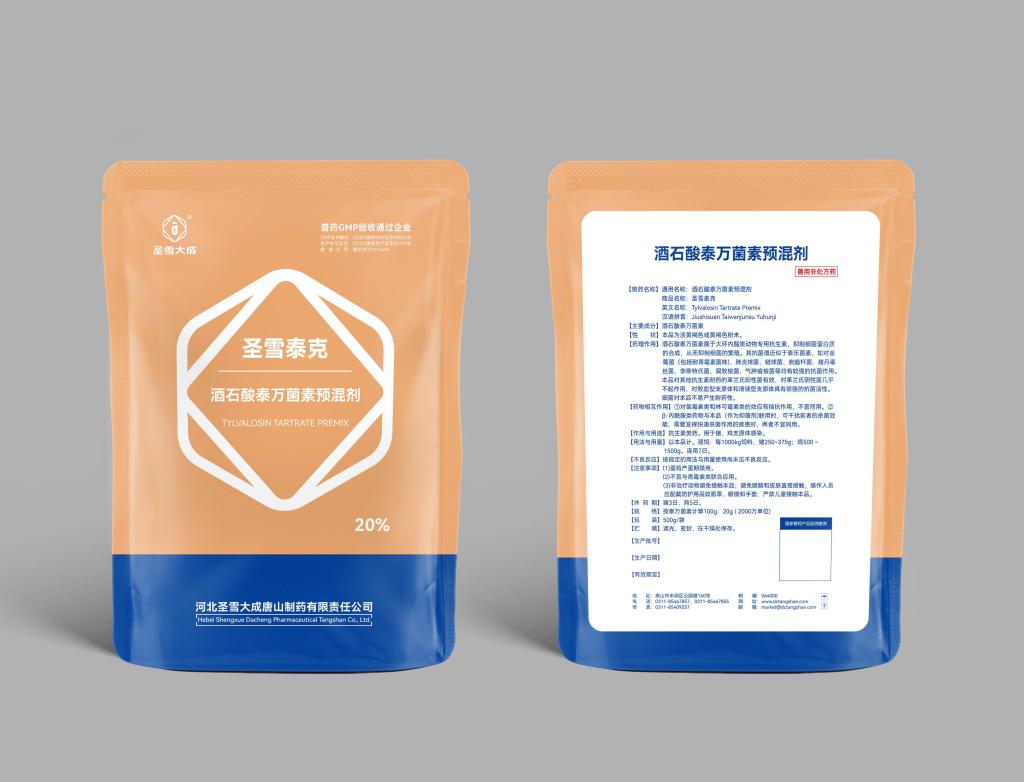Tel:+8618231198596

News
 CONTACT
CONTACT
 CONTACT
CONTACT
- Linkman:Linda Yao
- Tel: +8618231198596
- Email:linda.yao@dcpharma.cn
- Linkman:CHARLES.WANG
- Department:Overseas
- Tel: 0086 0311-85537378 0086 0311-85539701
News
Current Position:
Home >
News
>Tylvalosin tartrate premix is effective in both prevention and treatment strategies.
Tylvalosin tartrate premix is effective in both prevention and treatment strategies.
TIME:2024-07-17
Mechanisms of Action
Antibacterial Activity
Tylvalosin tartrate exerts its antibacterial effects by binding to the 50S ribosomal subunit of susceptible bacteria, thereby inhibiting peptide bond formation and halting protein synthesis. This mechanism disrupts bacterial growth and replication, leading to bacterial death and resolution of infections.
Immunomodulatory Effects
In addition to its direct antibacterial action, tylvalosin tartrate exhibits immunomodulatory properties that enhance the host's immune response. By stimulating innate immune defenses, tylvalosin tartrate supports animals in combating infections and reducing disease severity.
Applications in Veterinary Medicine
Prevention Strategies
Poultry
In poultry farming, preventing respiratory diseases such as Mycoplasma gallisepticum and Mycoplasma synoviae infections is crucial for maintaining flock health and productivity. Tylvalosin tartrate premix is used prophylactically to minimize disease transmission and economic losses associated with reduced egg production and growth rates.
Swine
Swine respiratory disease complex (SRDC), caused by pathogens like Mycoplasma hyopneumoniae, poses significant challenges in pig production. Tylvalosin tartrate premixes are incorporated into biosecurity protocols to prevent disease outbreaks, reduce respiratory symptoms, and improve overall herd health.
Treatment Strategies
Respiratory Infections
For animals already infected with respiratory pathogens, tylvalosin tartrate premix serves as an effective treatment option. It alleviates clinical signs, reduces lung lesions, and accelerates recovery, thereby minimizing production losses and enhancing animal welfare.
Gastrointestinal Disorders
Tylvalosin tartrate is also used to treat gastrointestinal disorders, including ileitis in pigs caused by Lawsonia intracellularis. Its antibacterial properties target bacterial pathogens in the digestive tract, promoting intestinal health and nutrient absorption in farm animals.
Dual Role in Veterinary Care
Tylvalosin tartrate premix's dual effectiveness in prevention and treatment strategies optimizes veterinary care practices:
Proactive Disease Management
By integrating tylvalosin tartrate into preventive health programs, veterinarians and farmers reduce the incidence of infectious diseases and mitigate disease spread within animal populations. This proactive approach minimizes the need for therapeutic interventions and associated costs.
Therapeutic Benefits
In cases where disease outbreaks occur, timely administration of tylvalosin tartrate premix facilitates rapid recovery and restores animal health. Its broad-spectrum antibacterial activity and immunomodulatory effects support comprehensive treatment regimens tailored to specific disease presentations.
Benefits of Tylvalosin Tartrate Premix
Enhanced Animal Health
Maintaining optimal health through preventive and therapeutic use of tylvalosin tartrate premix improves animal welfare and productivity. Healthy livestock exhibit better growth rates, reproductive outcomes, and resistance to environmental stressors, supporting sustainable farming practices.
Improved Production Efficiency
Effective disease prevention and treatment reduce production losses associated with morbidity and mortality in poultry and swine. Tylvalosin tartrate premix enhances feed conversion rates, growth performance, and economic profitability on farms.
Compliance with Regulatory Standards
Adhering to veterinary guidelines ensures responsible use of antibiotics like tylvalosin tartrate premix. Farmers follow withdrawal periods to minimize residues in animal products intended for human consumption, ensuring food safety and consumer confidence.
Contribution to Antimicrobial Stewardship
Promoting prudent antibiotic use practices preserves the efficacy of tylvalosin tartrate and mitigates antimicrobial resistance risks. Veterinarians collaborate with farmers to implement stewardship principles, including proper administration, monitoring, and surveillance of antibiotic therapies.
Challenges and Considerations
Resistance Management
Monitoring bacterial susceptibility and resistance patterns is crucial for preserving tylvalosin tartrate's effectiveness. Strategies such as rotational use with other antibiotics and surveillance programs help detect emerging resistance and inform treatment decisions.
Formulation and Administration
Ensuring the stability, bioavailability, and compatibility of tylvalosin tartrate premix formulations with animal feed and water presents formulation challenges. Advances in technology and veterinary pharmaceuticals address these considerations to optimize product efficacy and safety.
Education and Training
Continuous education for veterinarians and farmers enhances awareness of tylvalosin tartrate's applications, dosage regimens, and biosecurity measures. Training programs promote compliance with veterinary guidelines and foster informed decision-making in disease management.
Future Perspectives
Research and Innovation
Ongoing research into tylvalosin tartrate's pharmacological properties, formulation development, and alternative therapies supports its role in veterinary care. Innovations in antibiotic stewardship, vaccine technologies, and probiotics offer sustainable solutions to disease prevention and management in livestock.
Global Collaboration
International collaboration among agricultural stakeholders, research institutions, and regulatory agencies strengthens biosecurity initiatives and antimicrobial resistance mitigation strategies. Shared knowledge and resources facilitate global health efforts and support resilient farming systems.
Conclusion
Tylvalosin tartrate premix demonstrates dual effectiveness in both prevention and treatment strategies in veterinary medicine. By integrating tylvalosin tartrate into biosecurity protocols, veterinarians and farmers uphold animal health, enhance production efficiency, and promote sustainable agriculture practices. Challenges such as resistance management and formulation optimization require ongoing research, education, and global collaboration to ensure responsible antibiotic use and preserve tylvalosin tartrate's therapeutic efficacy. Through proactive disease management and therapeutic interventions, tylvalosin tartrate premix contributes to resilient farming systems and food security worldwide.
- Tel:+8618231198596
- Whatsapp:18231198596
- Chat With Skype







